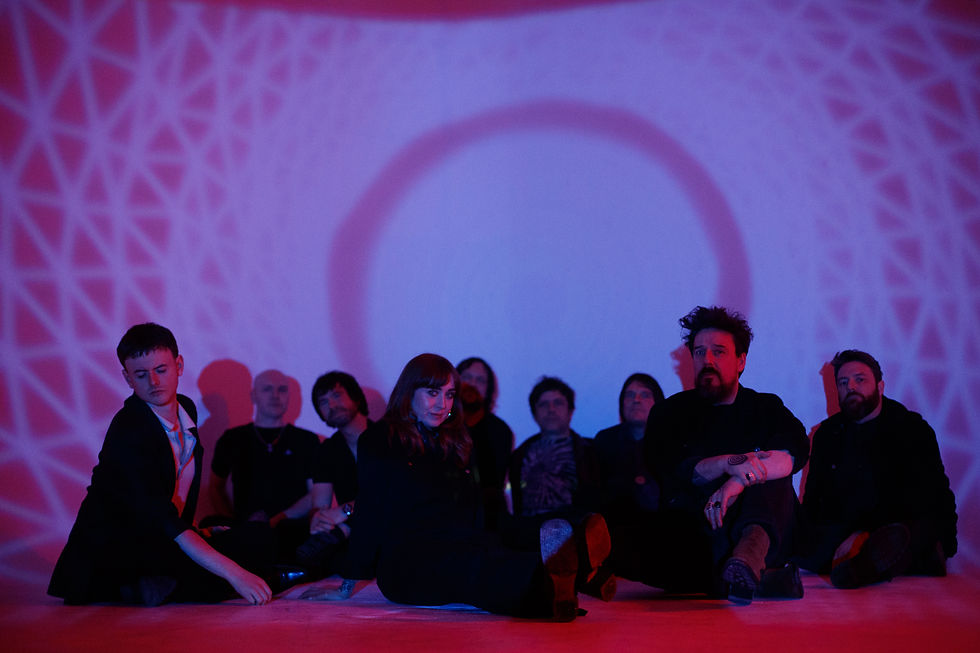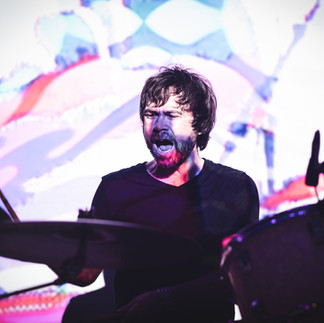Helicon Interview
- REAL
- Sep 15, 2025
- 6 min read
We’ve been following Helicon for a while now, and they’re one of those bands that never stand still. Rooted in Glasgow’s underground, they’ve spent the last decade pushing psychedelia into strange and exciting places, blending sitar, fuzz and hypnotic grooves with a raw energy that feels completely their own. Their gigs are legendary, chaotic, loud, immersive and often completely unhinged, but they also know how to craft albums that grow sharper and more ambitious with every release.
We caught up with them to hear about the first time the sitar became part of the band, the wildest things that have happened on stage, and what’s coming next on their fourth album, recorded at Mogwai’s Castle of Doom studio.

Your music blends traditional Indian instruments like the sitar with heavy psychedelic fuzz. What’s the story behind your first encounter with the sitar, and how did it become such a core part of Helicon’s sound?
It’s Brian Jones’ and George Harrison’s fault. I’ve loved 60s counterculture and psychedelic music since I was a young teenager. In the early 90s my brother Gary and I got really into The Beatles, The Stones, Pink Floyd, The Doors, etc, as you do at that age, but not the hits. It was the weirder, more experimental stuff that intrigued and inspired us. So that leads you down that rabbit hole, where you discover their influences like Ravi Shankar, Ali Akbar Khan and other classical Indian musicians. Distinctiveness is important for any band or artist to get noticed. We first decided to bring sitar into the Helicon sound in 2015 when recording our Gehenna EP for EXAG Records, based in Brussels, Belgium. Our song ‘In A Sad Red Dusk’ needed a little something different, and the sitar was the answer. Fortunately, we knew ‘Groovy’ Graham from his time in other bands around Glasgow and that he played sitar – properly – in a sort of 60s psychedelic covers band. We got him in for that recording session, hit it off immediately, and the rest is history.
When you’re building a song, what usually comes first — the hypnotic groove, the atmospheric layers, or a lyrical concept?
When I’m writing, it’s always the groove or the main hook/riff. Then I’ll bring the band in to contribute their parts. The last thing I consider is lyrics or a vocal melody because it’s not how I listen to music. I don’t pay much attention to lyrical content or narrative. I'm more interested in the emotion being projected pr communicated by the music. How do I want to make the listener feel? But as the band members have changed over the years and we’ve brought in more songwriters, I know they all work slightly differently. Declan for example, is very lyric and melody focused, more of a storyteller. So he will build his songs from there, but I’m the exact opposite.

Your live shows are intense and immersive. What’s the wildest or most unexpected thing that’s ever happened on stage during a gig?
Fuck me, there have been a few. From someone trying to steal a ride cymbal and stand off stage mid-performance in Marseille – which sparked a mass brawl with security in the venue as we carried on playing. We’ve had 2 drummers fall off the stage. The first was many years ago with our first drummer Martin. It was his last show before he left to live in Chicago with his new wife, so it was a bit of a party. He’d enjoyed a few too many pre-show whiskies, and mid-set, the drums stopped. I thought he’d maybe dropped a stick, but as I turned around, he wasn’t there behind the kit and had fallen about 5ft backwards off the stage behind a curtain. To his eternal credit, he took the crowd cheers and carried on. Our current drummer Seb did the same thing at a festival in Nottingham. And it happened to Graham, the sitar player, when we headlined Glastonbury Psych Fest a couple of years ago. He misjudged the side of the stage, and there’s video footage somewhere of him disappearing, then popping back up again and carrying on. As he falls Gary kinda half goes to catch him, then decides ‘fuck it’ and carries on playing as Graham pops back up into view. I think that’s why he demands to be centre stage now. Oh yeah, we were once unexpectedly joined on stage at a festival performance by a 6ft rabbit in stockings, suspenders and faux fur coat.
Get tickets to their upcoming show with us here: https://www.realsounds.uk/event-details/262
Your debut album had a raw, heavy edge, while This Can Only Lead to Chaos turned that chaos into something sharper, and God Intentions felt almost euphoric in parts. How conscious is that evolution, or does it just happen naturally as you grow as a band?
It’s a conscious decision. I have no interest in making the same album twice, being derivative or predictable. Each album tries to capture what we were experiencing or feeling at that time, but with a sense of permanency that makes it sound or feel timeless. The craft of your songwriting gets much better as you become more experienced, so that plays a major part as you start to find your voice, knowing what you want to express, and then how to express it. Just wait till you hear the new one!
Being a collective with rotating members sounds exciting but complex. How do you keep the creative energy balanced and avoid chaos — or do you embrace the chaos?
It’s a blessing and a curse. It can create a rich kaleidoscope of ideas to choose from and work through together, but then you have up to 9 opinions and egos to manage. The key is a communal understanding that the best idea wins. Always. Irrespective of who has it. And you share in the success or failure of that idea equally. Everyone gets a voice, but eventually, there needs to be an understanding that the band leader has to decide, as you don’t create great art by committee. As long as every debate and decision is guided by what serves the best interest of the song, the album and the band, you won’t go far wrong. If you allow anything else to lead the creative decisions you make, then you’re cheating yourself.
You’ve worked with a string quartet and even brought in Lavinia Blackwall for God Intentions. If budget and logistics weren’t a problem, who would be your dream collaboration — living or dead?
Zippy, George and Bungle from the 1980s kids TV show Rainbow.
Some people call your music ‘space rock,’ others say ‘acid psych,’ some even say ‘shoegaze with sitar.’ How do you describe Helicon to someone who’s never heard a note?
An irresistible, 18-legged, psychedelic groove machine.
Glasgow has such a strong underground scene. How has the city shaped your sound and your creative approach?
The worst thing that any music can be is pretentious. And Glasgow doesn’t tolerate pretentiousness. I’ve never thought of our sound as particularly Glaswegian or Scottish, but when we tour, people tell us they can hear it. I suppose the mix of a gritty edge and gallows humour bleeds into everything we do, whether we intend it or not. If you’re being authentic, then it’ll be there somewhere. We are all from pretty modest backgrounds, so I think the working-class graft keeps us honest and acutely aware to never disappear up our own arseholes.

You’re working on your fourth album now at Mogwai’s Castle of Doom studio in Glasgow. Can you share a little teaser — maybe a mood, a theme, or even just a single word that sums up where it’s headed?
Glaswegian psychedelia meets LA triphop.
This album is gonna take you somewhere you haven’t been before. We’ve collaborated with LA-based DJ and artist Al Lover on this album, and it’s the most exciting thing we’ve ever done, blending styles and genres to create something distinctive, unique and utterly infectious. Wall to wall bangers.
It’s out on Fuzz Club early 2026, but the first singles will be released late October ‘25.
If Helicon’s music were the soundtrack to an imaginary movie, what would the title of that movie be, and who would direct it?
9 Flew Under The Cuckoo’s Nest, directed by Cheech and Chong.

By the REAL Editorial Team | Sep 15, 2025















